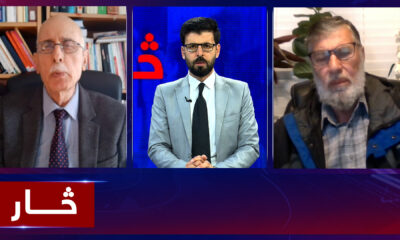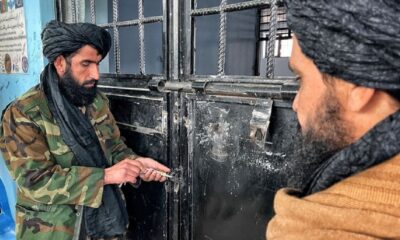Regional
Karabakh Armenians dissolve breakaway govt in capitulation to Azerbaijan
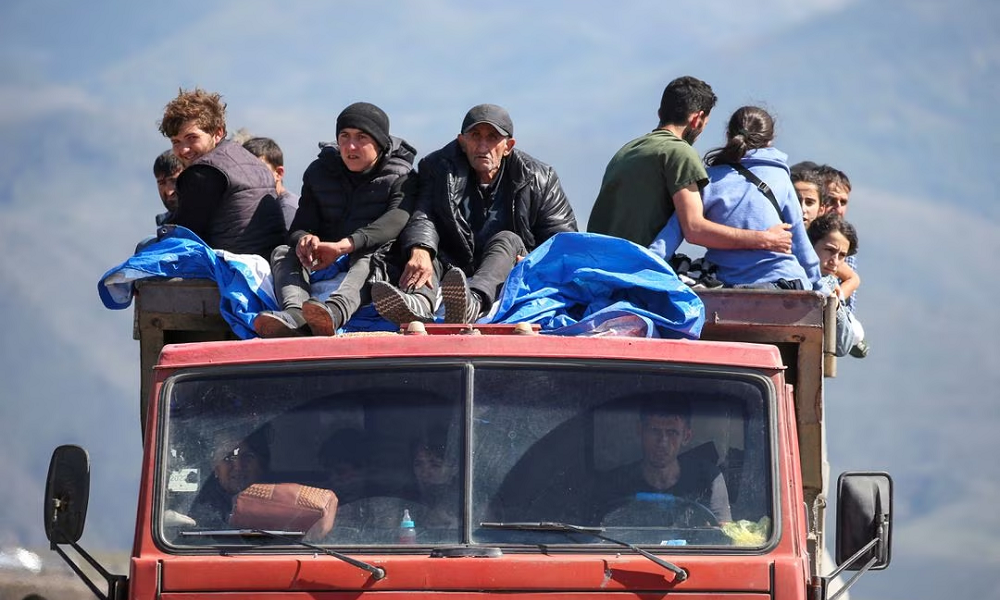
Ethnic Armenians in Nagorno-Karabakh said on Thursday they were dissolving the breakaway statelet they had defended for three decades, where more than half the population has fled since Azerbaijan launched a lightning offensive last week.
In a statement, they said their self-declared Republic of Artsakh would “cease to exist” by Jan. 1, in what amounted to a formal capitulation to Azerbaijan.
For Azerbaijan and its president, Ilham Aliyev, the outcome is a triumphant restoration of sovereignty over an area that is internationally recognised as part of its territory but whose ethnic Armenian majority won de facto independence in a war in the 1990s, Reuters reported.
For Armenians, it is a defeat and a national tragedy.
Some 70,500 people had crossed into Armenia by early Thursday afternoon, Russia’s RIA news agency reported, out of an estimated population of 120,000.
“Analysis of the situation shows that in the coming days there will be no Armenians left in Nagorno-Karabakh,” Interfax news agency quoted Armenian Prime Minister Nikol Pashinyan as saying. “This is an act of ethnic cleansing.”
Azerbaijan denies that accusation, saying it is not forcing people to leave and that it will peacefully reintegrate the Karabakh region and guarantee the civic rights of the ethnic Armenians.
Karabakh Armenians say they do not trust that promise, mindful of a long history of bloodshed between the two sides including two wars since the break-up of the Soviet Union. For days they have fled en masse down the snaking mountain road through Azerbaijan that connects Karabakh to Armenia.
Azerbaijan’s ambassador to London, Elin Suleymanov, told Reuters in an interview that Baku did not want a mass exodus from Karabakh and was not encouraging people to leave.
He said Azerbaijan had not yet had a chance to prove what he said was its sincere commitment to provide secure and better living conditions for those ethnic Armenians who choose to stay.
The Kremlin said on Thursday it was closely monitoring the humanitarian situation in Karabakh and said Russian peacekeepers in the region were providing assistance to residents. It said Russian President Vladimir Putin had no plans to visit Armenia.
Western governments have also expressed alarm over the humanitarian crisis and demanded access for international observers to monitor Azerbaijan’s treatment of the local population.
Samantha Power, head of the U.S. Agency for International Development (USAID), said this week she had heard “very troubling reports of violence against civilians”.
Azerbaijan said Aliyev had told her at a meeting on Wednesday that the rights of ethnic Armenians would be protected by law, like those of other minorities.
“The Azerbaijani president noted that the civilian population had not been harmed during the anti-terrorist measures, and only illegal Armenian armed formations and military facilities had been targeted,” a statement said.
Aliyev’s office said on Thursday he was visiting Jabrayil, a city on the southern edge of Karabakh that was destroyed by Armenian forces in the 1990s, which Azerbaijan recaptured in 2020 and is now rebuilding.
While saying he had no quarrel with ordinary Karabakh Armenians, Aliyev last week described their leaders as a “criminal junta” that would be brought to justice.
A former head of Karabakh’s government, Ruben Vardanyan, was arrested on Wednesday as he tried to cross into Armenia. Azerbaijan’s state security service said on Thursday he was being charged with financing terrorism and with illegally crossing the Azerbaijani border last year.
David Babayan, an adviser to the Karabakh leadership, said in a statement he was voluntarily giving himself up to the Azerbaijani authorities.
Mass displacements have been a feature of the Karabakh conflict since it broke out in the late 1980s as the Soviet Union headed towards collapse.
Between 1988 and 1994 about 500,000 Azerbaijanis from Karabakh and the areas around it were expelled from their homes, while the conflict prompted 350,000 Armenians to leave Azerbaijan and 186,000 Azerbaijanis to leave Armenia, according to “Black Garden: Armenia and Azerbaijan Through Peace and War”, a 2003 book by Caucasus scholar and analyst Thomas de Waal.
Many of the Armenians escaping this week in heavily laden cars, trucks, buses and even tractors said they were hungry and fearful.
“This is one of the darkest pages of Armenian history,” said Father David, a 33-year-old Armenian priest who came to the border to provide spiritual support for those arriving. “The whole of Armenian history is full of hardships.”
Regional
Powerful quake in Southeast Asia kills several, Myanmar declares state of emergency
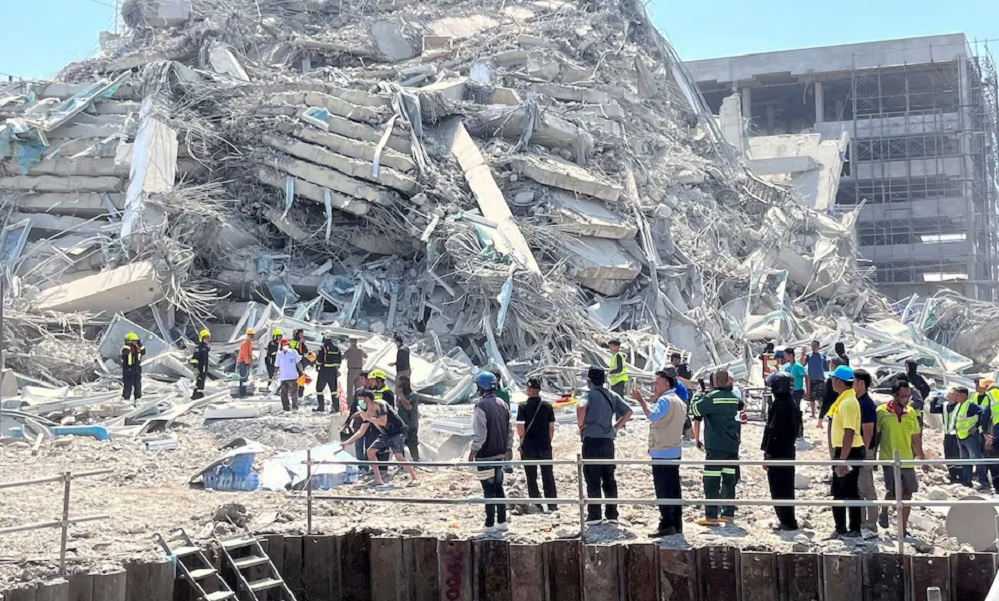
A powerful earthquake rocked Southeast Asia on Friday, killing several people, bringing down a skyscraper under construction in Bangkok and toppling buildings in neighbouring Myanmar, where the ruling junta declared a state of emergency in some areas.
At least three people were killed in the town of Taungoo in Myanmar when a mosque partially collapsed, witnesses said, while local media reported that at least two people died and 20 were injured after a hotel collapsed in Aung Ban, Reuters reported.
In Thailand, at least one person was killed and dozens of workers were rescued from under the rubble of the skyscraper that had been under construction in Bangkok, Thailand’s National Institute of Emergency Medicine said.
Bangkok’s city authorities declared the capital a disaster-stricken area, saying they needed to assess and monitor damaged areas, and assist people who might still be at risk.
In Bangkok, people ran out onto the streets in panic, many of them hotel guests in bathrobes and swimming costumes as water cascaded down from an elevated pool at a luxury hotel, witnesses said.
The United States Geological Survey (USGS) said the quake, which struck at lunchtime, was of 7.7 magnitude and at a depth of 10 km (6.2 miles). It was followed by a powerful aftershock.
The epicentre was about 17.2 km from the Myanmar city of Mandalay, which has a population of about 1.5 million.
Myanmar’s ruling military declared a state of emergency in multiple regions.
“The state will make inquiries on the situation quickly and conduct rescue operations along with providing humanitarian aid,” it said on the Telegram messaging app.
Mandalay is Myanmar’s ancient royal capital and at the centre of the country’s Buddhist heartland.
Social media posts showed collapsed buildings and debris strewn across streets in the city. Reuters could not immediately verify the posts.
One witness in the city told Reuters: “We all ran out of the house as everything started shaking. I witnessed a five-storey building collapse in front of my eyes. Everyone in my town is out on the road and no one dares to go back inside buildings.”
Another witness in the city, Htet Naing Oo, told Reuters that a tea shop had collapsed with several people trapped inside. “We couldn’t go in,” she said. “The situation is very bad.”
At least three people died after a mosque in Taungoo partially collapsed, two eyewitnesses told Reuters.
“We were saying prayers when the shaking started… Three died on the spot,” said one of two people who spoke to Reuters.
Local media reported a hotel in Aung Ban, in Shan state, crumbled into rubble, with one outlet, the Democratic Voice of Burma, reporting two people had died and 20 were trapped.
Video and images posted by Myanmar Now showed a roof cratered at a market in the capital, Naypyitaw.
In Mandalay, the outlet’s images showed a clock tower had collapsed and part of the wall by Mandalay Palace was in ruins.
China’s Xinhua news agency said strong tremors were felt in southwestern Yunnan province, which borders Myanmar, but there were no reports of casualties.
Witnesses contacted in Yangon, Myanmar’s largest city, said many people ran out of buildings.
OFFICE TOWER SHAKES IN BANGKOK
One office tower in downtown Bangkok swayed from side to side for at least two minutes, with doors and windows creaking loudly, witnesses said.
Hundreds of employees filed out via emergency stairs as some shocked and panicked workers froze. Loud shrieks could be heard as the building continued to sway.
Outside, hundreds gathered in the afternoon sun, while staff with medical kits found office chairs for the elderly and people in shock.
China’s Xinhua news agency said strong tremors were felt in southwestern Yunnan province, which borders Myanmar, but there were no reports of casualties.
Regional
Iran ready for indirect talks with US, Khamenei aide says
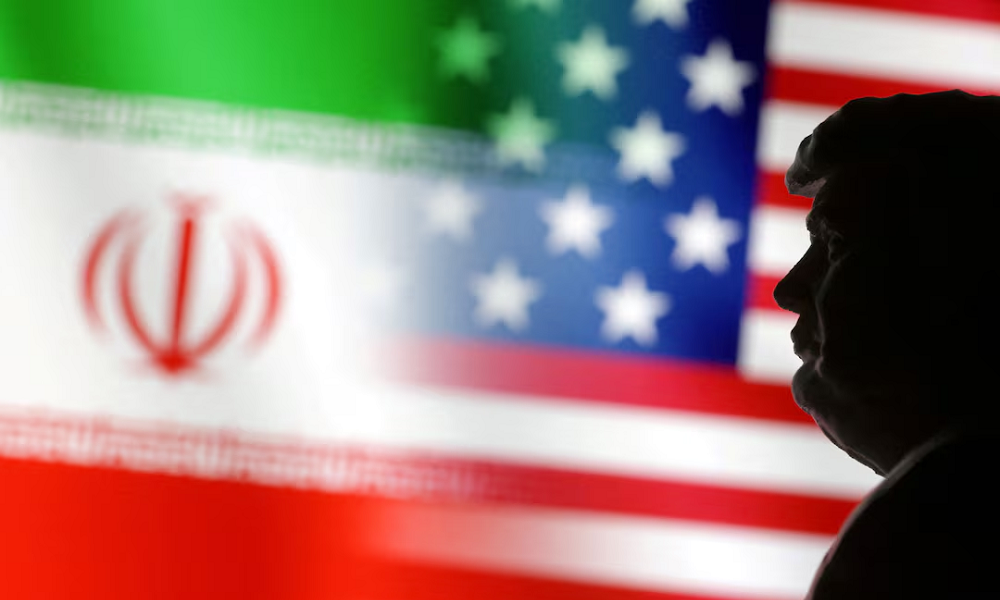
Kamal Kharrazi, an adviser to Iran’s supreme leader, said on Thursday Tehran has not closed all doors to resolve its disputes with the United States and is ready for indirect negotiations with Washington.
Tehran has so far rebuffed U.S. President Donald Trump’s warning it to make a deal or face military consequences. Supreme Leader Ayatollah Ali Khamenei called the message deceptive and Foreign Minister Abbas Araqchi said talks are impossible unless Washington changes its “maximum pressure” policy.
“The Islamic Republic has not closed all doors. It is ready for indirect negotiations with the United States in order to evaluate the other party, state its own conditions and make the appropriate decision,” Kharrazi said, according to the semi-official Iranian Students News Agency.
Iran is meant to soon reply to Trump’s letter, with Araqchi saying last week that Tehran would take into consideration both Trump’s threat and opportunities in its response.
In his first 2017-21 term, Trump withdrew the U.S. from a 2015 deal between Iran and world powers that placed strict limits on Tehran’s disputed nuclear activities in exchange for sanctions relief.
After Trump pulled out in 2018 and reimposed sweeping U.S. sanctions, the Islamic Republic breached and has since far surpassed those limits in its escalating programme of uranium enrichment.
Western powers accuse Iran of having an clandestine agenda to develop nuclear weapons capability by enriching uranium to a high level of fissile purity, above what they say is justifiable for a civilian atomic energy programme.
(Reuters)
Regional
Pakistan, China in talks about security for Chinese nationals
Chinese nationals have been targeted by separatist militants who believe Beijing is helping Pakistan exploit minerals in Balochistan
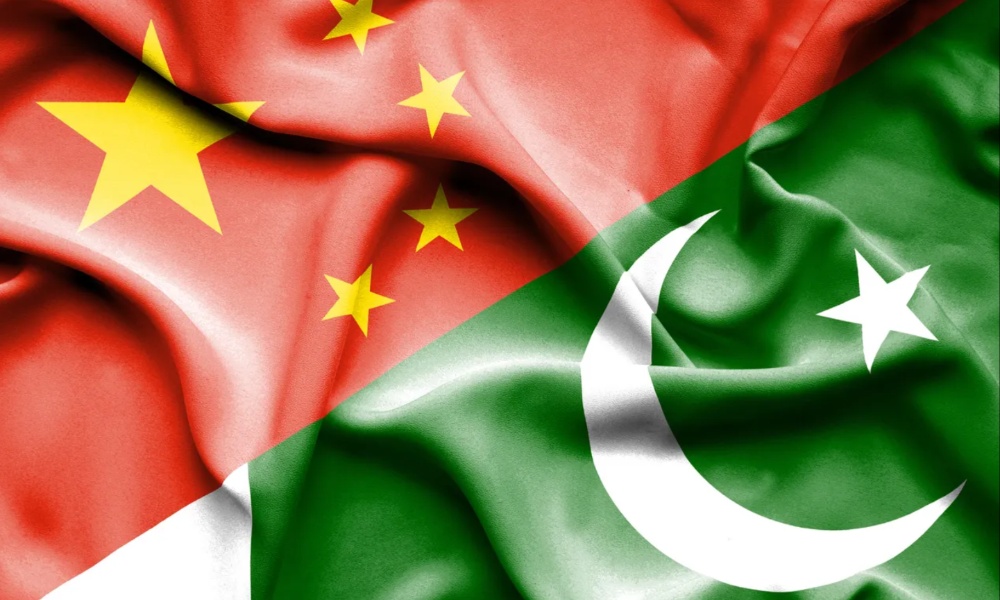
Pakistan and China’s discussions about security measures to protect Chinese nationals working in the South Asian country are a work in progress, Islamabad’s ambassador to Beijing said on Wednesday.
Chinese nationals have been in the crosshairs of separatist militants who believe Beijing is helping Pakistan exploit minerals in the underdeveloped southwestern province of Balochistan, where China has a strategic port and mining interests, Reuters reported.
It is Pakistan’s “national responsibility” and the country is “doing everything possible”, Ambassador Khalil Hashmi told reporters at the sidelines of the Boao Forum in China’s Hainan province.
“I think our two countries work very closely in terms of information sharing, in terms of developing the standard operating procedures” to ensure Chinese nationals working in Pakistan are safe, he said.
“We keep our Chinese friends informed of the steps that we are taking, so it’s a work in progress.”
Beijing has been pushing Pakistan to allow its own security staff to provide protection to thousands of Chinese citizens working there, frustrated by the string of attacks on its citizens.
The push came after a bombing at the Karachi airport last October killed two Chinese engineers who were returning there to work at a power plant.
Hashmi said those talks are ongoing, with a high degree of trust between both countries.
“It’s a complex security environment,” he said, “We have the capability to resolve, to counter and combat and defeat these terrorist forces.”
-

 International Sports5 days ago
International Sports5 days agoIPL 2025: Last over drama; Ashutosh Sharma clinches win for Delhi Capitals
-
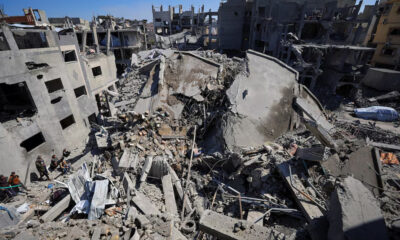
 Regional5 days ago
Regional5 days agoEgypt makes new proposal to restore Gaza truce as Israeli strikes kill 65
-

 Sport4 days ago
Sport4 days agoAfghanistan eliminated from Asian Beach Soccer Championship
-
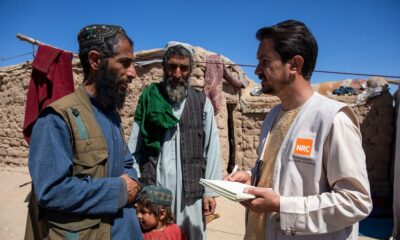
 Latest News4 days ago
Latest News4 days agoNorwegian Refugee Council cuts back on essential humanitarian services in Afghanistan
-
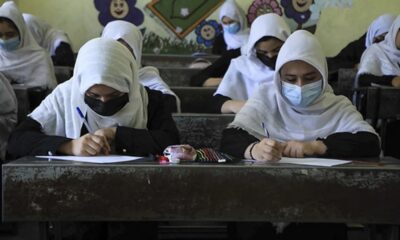
 Latest News4 days ago
Latest News4 days agoUN warns over 4 million Afghan girls will be deprived of education by 2030 if ban continues
-

 World4 days ago
World4 days agoSecretive Chinese network tries to lure fired US federal workers, research shows
-
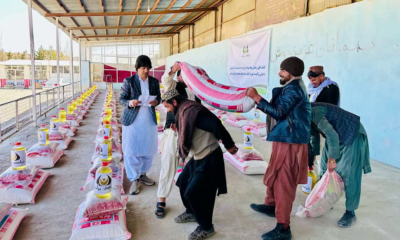
 Latest News4 days ago
Latest News4 days agoDozens of needy families in Ghazni get much needed food aid from Bayat Foundation
-

 Sport4 days ago
Sport4 days agoAFC Asian Cup 2027 Qualifiers: Myanmar defeat Afghanistan 2-1




